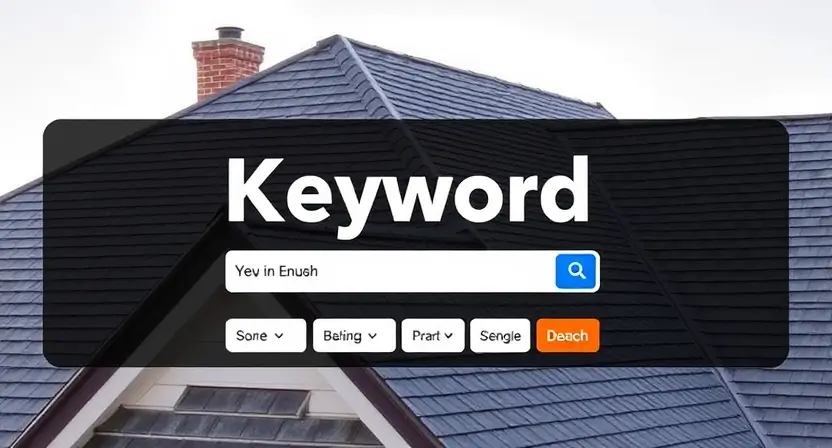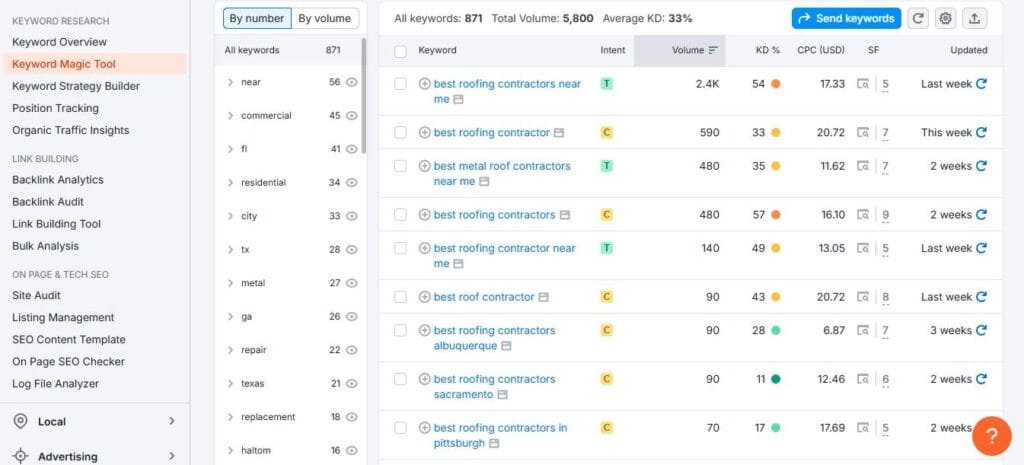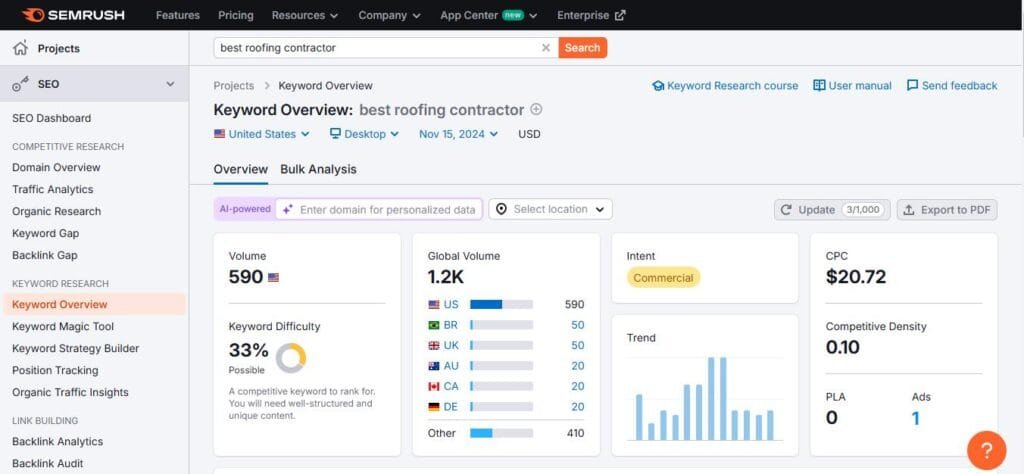Keyword research is a crucial part of any successful SEO strategy, especially for roofing companies looking to attract more local clients. By understanding what potential customers are searching for online, you can target the right keywords to help your website rank higher in search results. In this guide, we’ll walk you through the basics of keyword research for roofing companies, with practical examples to help you get started.

Why Keyword Research Matters for Roofing Companies
Keyword research helps you discover the terms and phrases people use to find roofing services. When you know these keywords, you can optimize your website, blog posts, and other content to attract the right audience—people who are actively looking for roofing solutions. This not only improves your visibility in search results but also drives more relevant traffic to your site.
For example, if you’re a roofing company in Atlanta, it’s better to target keywords like “roof repair in Atlanta” or “Atlanta roofing contractor” rather than general terms like “roof repair” that are too broad and competitive.
The Basics of Keyword Research for Roofing Companies
Let’s break down the process of keyword research into simple steps. Each step is designed to help you find the most effective keywords for your roofing business.

1. Start with Seed Keywords
Seed keywords are the basic terms related to your business. For a roofing company, seed keywords might include:
- “roof repair”
- “roof replacement”
- “roofing contractor”
- “roof inspection”
These keywords describe your main services. Think of them as the starting point for your research.
Example:
If you own a roofing company in Denver, you might start with seed keywords like:
- “roof repair Denver”
- “roof replacement Denver”
- “roofing contractor Denver”
2. Expand with Long-Tail Keywords
Long-tail keywords are longer, more specific phrases that reflect what people actually search for. These keywords usually have lower search volume but also less competition, making it easier for your website to rank for them. Long-tail keywords are often questions or detailed phrases that people use when they are close to making a purchase decision.
Example:
From your seed keyword “roof repair Denver,” you might find long-tail keywords like:
- “affordable roof repair in Denver”
- “emergency roof repair Denver”
- “how much does roof repair cost in Denver”
These long-tail keywords help you target people who are specifically looking for roofing services in Denver, making them more likely to convert into clients.
3. Use Keyword Research Tools

Keyword research tools are essential for finding effective keywords. Some popular tools include:
- Google Keyword Planner (free)
- Ubersuggest (free with some limitations)
- Ahrefs (paid)
- SEMrush (paid)
These tools provide information about each keyword’s search volume (how often it’s searched), competition level, and related keywords.
Example:
Using Ubersuggest, you might start with “roof repair Denver.” The tool will suggest similar keywords and show the search volume for each one. Here’s what you might see:
- “roof repair Denver” (500 searches/month)
- “roofing companies in Denver” (800 searches/month)
- “roofing contractors near Denver” (300 searches/month)
This data helps you choose keywords with a balance of good search volume and manageable competition.
4. Analyze Your Competitors
One of the best ways to find keywords is by looking at what your competitors are ranking for. Search for roofing companies in your area and see which keywords they use in their titles, meta descriptions, and headings. Tools like Ahrefs and SEMrush allow you to enter a competitor’s website and view the keywords they rank for.
Example:
If a competitor is ranking well for “roof replacement in Denver,” you can analyze their page to see how they’re using this keyword. By understanding their strategy, you can adjust your own content to compete for similar keywords or identify other keyword gaps they may have missed.
5. Focus on Local Keywords
As a roofing contractor, local keywords are crucial because your clients are typically in a specific area. Local keywords include the location (city, neighborhood, or region) alongside your main service.
Example:
For a roofing company in Miami, use local keywords like:
- “roofing contractor Miami”
- “roof repair near South Beach”
- “best roof replacement in Miami”
Local keywords help you attract clients specifically looking for roofing services in your area, improving the chances of ranking in local search results.
6. Target Informational Keywords with Blog Content
Not all keywords are directly related to hiring a roofing company. Some are informational keywords—questions or topics that people search when they’re researching roofing issues. By creating blog posts that answer these questions, you can attract potential clients to your site, even if they’re not ready to hire yet. This helps build brand awareness and trust.
Example:
Consider informational keywords like:
- “How to know if you need a roof replacement”
- “Signs of a leaking roof”
- “Best roofing materials for hot climates”
Creating blog posts around these topics can attract traffic and position your business as an authority in roofing. For example, a post titled “Top 5 Signs You Need Roof Repair” targets people who may need your services soon.
7. Prioritize Keywords Based on Search Intent
Search intent refers to the reason behind a user’s search. For example:
- Transactional Intent: Keywords like “hire a roofing contractor” show that the person is ready to make a decision.
- Informational Intent: Keywords like “how to fix a leaking roof” suggest the person is researching options.
Understanding search intent helps you choose keywords that align with your business goals. If your main goal is to drive leads, prioritize transactional and local keywords. For blog posts, focus more on informational keywords.
Example:
For your service pages, prioritize keywords with transactional intent, such as “roof repair Denver.” For blog posts, focus on informational keywords like “how to maintain your roof in winter.”
8. Organize Keywords by Service and Page
Once you have a list of keywords, organize them by the type of page or content they should go on. For example:
- Homepage: Target general keywords like “roofing contractor in [City].”
- Service Pages: Each service should have its own page with targeted keywords like “roof replacement in [City]” or “emergency roof repair in [City].”
- Blog Posts: Use informational keywords for blog content that answers common questions or provides useful tips.
Example:
If you offer roof inspection services, create a dedicated page optimized for “roof inspection in [City]” and similar keywords. If you create a blog post about common roofing issues, target keywords like “signs of roof damage” or “how often should I inspect my roof.”
Putting It All Together: Sample Keyword Research Process

Let’s go through a sample keyword research process for a roofing company in Austin, Texas:
- Start with Seed Keywords: Begin with keywords like “roof repair,” “roof replacement,” and “roofing contractor.”
- Add Location: Narrow down to local keywords, such as:
- “roof repair Austin”
- “roofing contractor Austin”
- “roof replacement in Austin”
- Use Keyword Tools: Enter “roof repair Austin” in a keyword tool like Ubersuggest. You might find additional keywords like:
- “emergency roof repair Austin” (200 searches/month)
- “roofing companies near Austin” (450 searches/month)
- “affordable roof repair Austin” (150 searches/month)
- Analyze Competitors: Check the top-ranking roofing companies in Austin and see what keywords they’re using. If a competitor ranks well for “roof inspection Austin,” consider adding this to your list.
- Expand with Long-Tail Keywords: Find more specific keywords that capture detailed search intent, such as:
- “cost of roof replacement Austin”
- “how to find a roofing contractor in Austin”
- Organize and Prioritize: Organize your keywords by page type and priority. Focus on local and transactional keywords for service pages and informational keywords for blog posts.
Get Started with Keyword Research Today
Keyword research is essential for roofing companies that want to increase visibility, attract local clients, and grow their business online. By following these basic steps, you can identify and prioritize keywords that will help your website rank higher in search results, bring in more traffic, and generate more leads.
If you’re ready to take your SEO efforts to the next level, consider partnering with an SEO for General Contractors agency that specializes in roofing companies. With professional support, you can create a keyword SEO strategy for Roofing Contractots that drives real results and helps your business dominate local search.



Pingback: The Essential Guide to SEO for Siding Contractors
Pingback: How to Become a Medical Courier Independent Contractor
Pingback: Mastering SEO for Stucco Contractors: A Complete Guide
My family members always say that I am killing my time here at net, holwever
I know I am getting experience everyday by reading thes nice articles. http://Boyarka-Inform.com